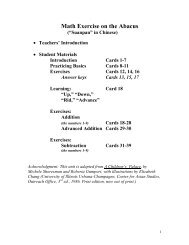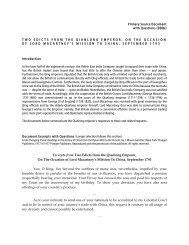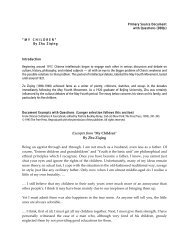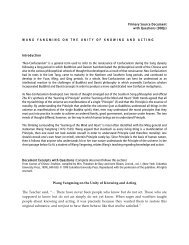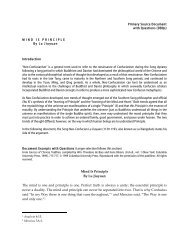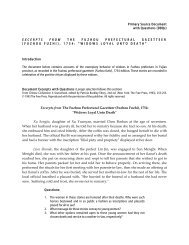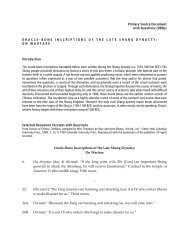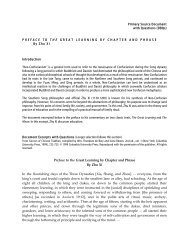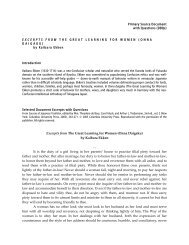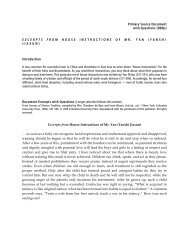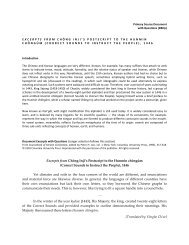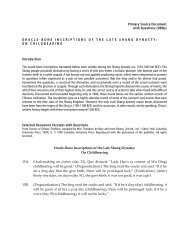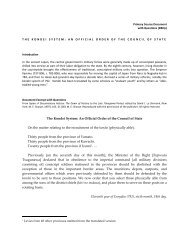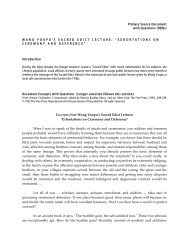Chông Yagyong on the Roots of Royal Authority - Asia for Educators ...
Chông Yagyong on the Roots of Royal Authority - Asia for Educators ...
Chông Yagyong on the Roots of Royal Authority - Asia for Educators ...
You also want an ePaper? Increase the reach of your titles
YUMPU automatically turns print PDFs into web optimized ePapers that Google loves.
PrimarySourceDocumentwithQuesti<strong>on</strong>s(DBQs)EXCERPTSFROMTHE YŎYUDANGCHŎNSŎ:CHŎ NGYAGYONG ONTHEROOTSOFROYALAUTHORITYIntroducti<strong>on</strong>LateChosŏnwasbesetwithanumber<strong>of</strong>politicalissues,mostnotablyfacti<strong>on</strong>alpowerstrugglesbetweendifferentgroups<strong>of</strong>elitesand<strong>of</strong>ficials.Chŏng<str<strong>on</strong>g>Yagy<strong>on</strong>g</str<strong>on</strong>g>(1762‐1836)wasanimportantlateChosŏnpoliticalthinkerassociatedwithaloose,re<strong>for</strong>m‐orientedschool<strong>of</strong>thoughtcalledSirhakorPracticalLearning.HereChŏngargueswithin<strong>the</strong>framework<strong>of</strong>C<strong>on</strong>fucianthought—indeed,<strong>for</strong>areturnto<strong>the</strong>supposedstandardsandpractices<strong>of</strong>earliertimes—infavor<strong>of</strong>afundamentalre<strong>for</strong>m<strong>of</strong>Chosŏnpoliticalprinciplesthatmightstrikeat<strong>the</strong>root<strong>of</strong>itsproblems.DocumentExcerptwithQuesti<strong>on</strong>s(L<strong>on</strong>gerselecti<strong>on</strong>followsthissecti<strong>on</strong>)From Sources <strong>of</strong> Korean Traditi<strong>on</strong>, edited by Yŏng‐ho Ch’oe, Peter H. Lee, and Wm. Theodore de Bary, vol. 2 (New York:ColumbiaUniversityPress,2000),26‐27.©2000ColumbiaUniversityPress.Reproducedwith<strong>the</strong>permissi<strong>on</strong><strong>of</strong><strong>the</strong>publisher.Allrightsreserved.Excerptsfrom<strong>the</strong> Yŏyudangchŏnsŏ:Chŏng<str<strong>on</strong>g>Yagy<strong>on</strong>g</str<strong>on</strong>g><strong>on</strong><strong>the</strong><strong>Roots</strong><strong>of</strong><strong>Royal</strong><strong>Authority</strong>Since<strong>the</strong>time<strong>of</strong><strong>the</strong>Handynasty,<strong>the</strong>emperorhasappointed<strong>the</strong>variousnobles,<strong>the</strong>nobles <strong>the</strong> county heads, <strong>the</strong> county heads <strong>the</strong> hamlet chiefs, and <strong>the</strong> hamlet chiefs haveselected <strong>the</strong> neighborhood chiefs. If any<strong>on</strong>e is so bold as to challenge his superiors, he iscastigatedasarebel.…Whydo<strong>the</strong>ylambasteasrebelsthosesuspected<strong>of</strong>lack<strong>of</strong>respect<strong>for</strong><strong>the</strong>ir superiors? In <strong>the</strong> past authority went from those below to those higher up. These days,however, authority runs from <strong>the</strong> top down, and any<strong>on</strong>e who tries to reverse that order islabeledasarebel.[TranslatedbyD<strong>on</strong>aldBaker]L<strong>on</strong>gerSelecti<strong>on</strong>From Sources <strong>of</strong> Korean Traditi<strong>on</strong>, edited by Yŏng‐ho Ch’oe, Peter H. Lee, and Wm. Theodore de Bary, vol. 2 (New York:ColumbiaUniversityPress,2000),26‐27.©2000ColumbiaUniversityPress.Reproducedwith<strong>the</strong>permissi<strong>on</strong><strong>of</strong><strong>the</strong>publisher.Allrightsreserved.Excerptsfrom<strong>the</strong> Yŏyudangchŏnsŏ:Chŏng<str<strong>on</strong>g>Yagy<strong>on</strong>g</str<strong>on</strong>g><strong>on</strong><strong>the</strong><strong>Roots</strong><strong>of</strong><strong>Royal</strong><strong>Authority</strong>Wheredorulerscomefromanyway?Do<strong>the</strong>ydropout<strong>of</strong><strong>the</strong>skylikerain?Ordo<strong>the</strong>ywellupout<strong>of</strong><strong>the</strong>groundlikespringwater?HereiswhatIthink.Fivehouseholds,makingup
PrimarySourceDocumentwithQuesti<strong>on</strong>s(DBQs)<strong>on</strong>EXCERPTSFROMTHEYŎYUDANGCHŎNSŎ:CHŎNGYAGYONGONTHEROOTSOFROYALAUTHORITY<strong>on</strong>e neighborhood, chose <strong>on</strong>e <strong>of</strong> <strong>the</strong>ir number to be <strong>the</strong> neighborhood chief. Then five suchcommunities,whichtoge<strong>the</strong>rmadeup<strong>on</strong>ehamlet,chose<strong>on</strong>e<strong>of</strong>thoseneighborhoodchiefstoserve as <strong>the</strong>ir hamlet chief. A few such hamlets c<strong>on</strong>stituted a township, and five townshipstoge<strong>the</strong>rmadeup<strong>on</strong>ecounty,with<strong>on</strong>e<strong>of</strong>thosefivetownships’leaderschosentoserveas<strong>the</strong>countyhead.Thepers<strong>on</strong><strong>the</strong>variouscountyheadschoseas<strong>the</strong>irleaderbecame<strong>the</strong>localfeudallord.And<strong>the</strong>pers<strong>on</strong><strong>the</strong>variousfeudallordschoseas<strong>the</strong>irleaderbecame<strong>the</strong>ruler.So<strong>the</strong>rulerwas some<strong>on</strong>e whom <strong>the</strong> populace selected. Since he could <strong>on</strong>ly be <strong>the</strong> ruler if <strong>the</strong> populaceselectedhimtobe<strong>the</strong>ruler,if<strong>the</strong>populacedidnotchoosehim,<strong>the</strong>nhecouldnotbe<strong>the</strong>ruler.There<strong>for</strong>e, if <strong>the</strong> five family heads found <strong>the</strong>y could not support <strong>the</strong>ir neighborhoodchief, <strong>the</strong>y met and decided <strong>on</strong> a replacement <strong>for</strong> him. If <strong>the</strong> five neighborhood chiefs found<strong>the</strong>y could not support <strong>the</strong>ir village head, <strong>the</strong> twenty‐five families met and decided <strong>on</strong> areplacement <strong>for</strong> him. If <strong>the</strong> various feudal princes and bar<strong>on</strong>s found <strong>the</strong>y could not support<strong>the</strong>irruler,<strong>the</strong>ymetanddecided<strong>on</strong>areplacement<strong>for</strong>him.Iffivefamilyheadscouldchange<strong>the</strong>irneighborhoodchiefandtwenty‐fivefamiliescouldchange<strong>the</strong>irvillagechief,<strong>the</strong>nwhyisit when subjects change <strong>the</strong>ir ruler, that is called a subject overthrowing his sovereign? Thisdoesnotmeanthatwhen<strong>the</strong>sovereignischanged,<strong>the</strong>pers<strong>on</strong>who<strong>on</strong>cesatassovereigncannotstepdowntoalesserpostasafeudalprince.…Let’ssay<strong>the</strong>reisatroupe<strong>of</strong>sixty‐fourdancersserving<strong>the</strong>court.Themembers<strong>of</strong><strong>the</strong>troupechoose<strong>on</strong>e<strong>of</strong><strong>the</strong>irnumbertogoto<strong>the</strong><strong>for</strong>efr<strong>on</strong>t,holding<strong>the</strong>ornamentalplumeandservingas<strong>the</strong>irleader.Ifhedoesagoodjob<strong>of</strong>setting<strong>the</strong>pace<strong>for</strong><strong>the</strong>dances,<strong>the</strong>n<strong>the</strong>rest<strong>of</strong><strong>the</strong>troupecallshim“ourmaster<strong>of</strong><strong>the</strong>dance.”Butifheturnsouttobeincapable<strong>of</strong>doingwhatisrequired<strong>of</strong>him,<strong>the</strong>n<strong>the</strong>trouperemoveshimasheadandtellshimtorejoin<strong>the</strong>ranks<strong>of</strong><strong>the</strong>o<strong>the</strong>r dancers. They <strong>the</strong>n select ano<strong>the</strong>r from <strong>the</strong>ir ranks and elevate him to <strong>the</strong> leadershippositi<strong>on</strong>,callinghim“ourmaster<strong>of</strong><strong>the</strong>dance.”Inthissituati<strong>on</strong>,<strong>the</strong>troupeasawholedecideswho should serve as <strong>the</strong> leader, who should be elevated to that positi<strong>on</strong> and who should beunseated. So what grounds would <strong>the</strong>re be <strong>for</strong> hurling a charge <strong>of</strong> rebelli<strong>on</strong> from within <strong>the</strong>ranksat<strong>the</strong>pers<strong>on</strong>chosentoreplace<strong>the</strong>previousleader?Since<strong>the</strong>time<strong>of</strong><strong>the</strong>Handynasty,<strong>the</strong>emperorhasappointed<strong>the</strong>variousnobles,<strong>the</strong>nobles <strong>the</strong> county heads, <strong>the</strong> county heads <strong>the</strong> hamlet chiefs, and <strong>the</strong> hamlet chiefs haveselected <strong>the</strong> neighborhood chiefs. If any<strong>on</strong>e is so bold as to challenge his superiors, he iscastigatedasarebel.…Whydo<strong>the</strong>ylambasteasrebelsthosesuspected<strong>of</strong>lack<strong>of</strong>respect<strong>for</strong><strong>the</strong>ir superiors? In <strong>the</strong> past authority went from those below to those higher up. These days,however, authority runs from <strong>the</strong> top down, and any<strong>on</strong>e who tries to reverse that order islabeledarebel.Questi<strong>on</strong>s:1. For Chŏng, what c<strong>on</strong>stitutes a ruler’s legitimacy or right to rule? Whatmightbeanalternativetohispositi<strong>on</strong>?[TranslatedbyD<strong>on</strong>aldBaker]<strong>Asia</strong> <strong>for</strong> <strong>Educators</strong> l Columbia University l http://afe.easia.columbia.edu Page 2 <strong>of</strong> 3
PrimarySourceDocumentwithQuesti<strong>on</strong>s(DBQs)<strong>on</strong>EXCERPTSFROMTHEYŎYUDANGCHŎNSŎ:CHŎNGYAGYONGONTHEROOTSOFROYALAUTHORITY2. What does Chŏng think <strong>of</strong> those o<strong>the</strong>rs label “rebels”? Under whatc<strong>on</strong>diti<strong>on</strong>s might he find <strong>the</strong> rebelli<strong>on</strong> <strong>of</strong> inferiors against superiorsjustified?3. In Chǒng’s perspective, what deleterious effects might authority flowingfrom<strong>the</strong>topdownhaveup<strong>on</strong>asociety?<strong>Asia</strong> <strong>for</strong> <strong>Educators</strong> l Columbia University l http://afe.easia.columbia.edu Page 3 <strong>of</strong> 3



